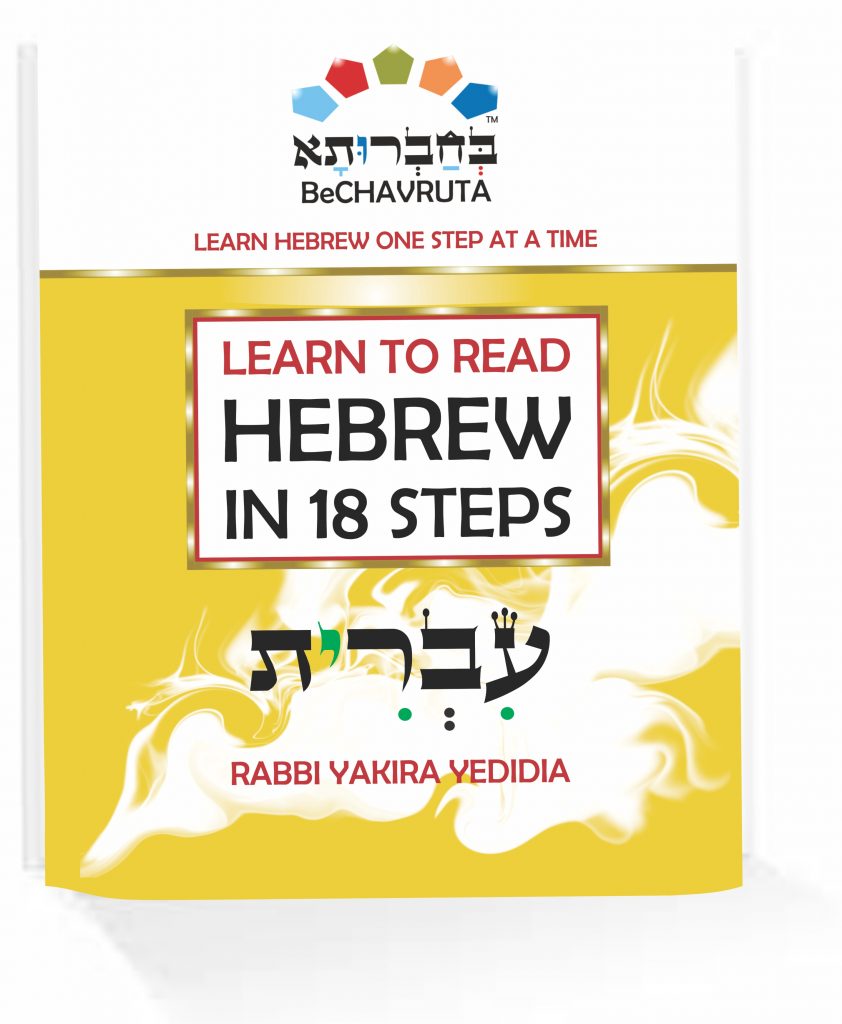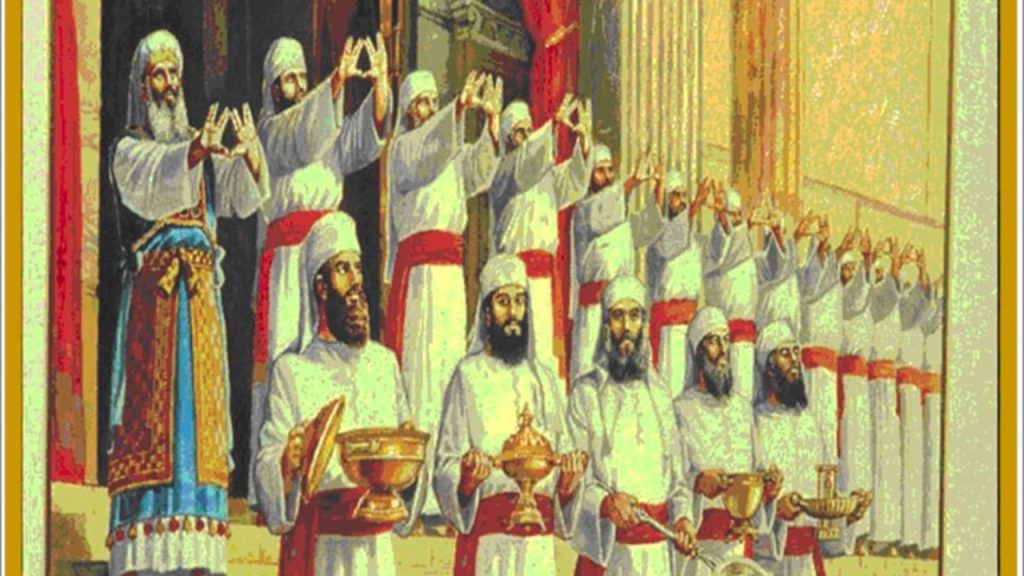Can you see?
In parashat Reeh, “See”, Mosheh set before the Israelites the choice between blessing and curse. They will be blessed when they fulfill G‑d’s commandments, and they will be cursed if they abandon the mitzvot. Mosheh instructed the Israelites in the laws that they were to observe, including the law of a single centralized place of worship. A Temple should be established in “the place that G‑d will choose to make dwell His name there,” where the people will bring their sacrifices to Him, it is forbidden to make offerings to G‑d in any other place. Mosheh warned against following other gods and their prophets and set forth the laws of kashrut, tithes, the mitzvah of charity obligates a Jew to help the needy with a gift or loan. On the Sabbatical year (occurring every seventh year), all loans are to be forgiven. All indentured servants are to be set free after six years of service, firstborn cattle and sheep are to be offered in the Temple, and their meat eaten by the kohanim (priests), and the law of the three pilgrimage festivals: Passover, Shavuot and Sukkot, when all should go to “see and be seen” before G‑d in the Holy Temple.
We read Parashat Reeh during he week of Rosh Chodesh Elul, the twelfth month of the civil and sixth of the religious year, a time of repentance, a time to search one’s heart and draw close to God in preparation for the coming Day of Judgement, Rosh Hashanah, and Day of Atonement, Yom Kippur.
The Hebrew word “Elul” can be an acronym for the phrase “Ani L’dodi V’dodi Li”- “I am my beloved’s and my beloved is mine”. Rabbi Shneur Zalman of Liadi compared, by way of analogy, the month of Elul to a king visiting his peasants in the field before returning to his palace.
During the month of Elul, leading up to the High Holy Days, It is customary to blow the shofar every morning (except on Shabbat) from Rosh Hodesh Elul (the first day of the month) until the day before Rosh Hashanah. The blasts are meant to awaken one’s spirits and inspire him to begin the soul searching which will prepare him for the High Holy Days. During Elul, we’re granting and asking for forgiveness.
During Elul we recite selichot (special penitential prayers) every morning (Sephardi tradition).
Many Jews also visit the graves of loved ones throughout the month in order to remember and honor those people in our past who inspire us to live more fully in the future.
During the month of Elul we wishes that the recipient have a good year. The standard blessing is “K’tivah VaChatima Tovah” (“a good writing and sealing [of judgement]”), meaning that the person should be written and sealed in the Book of Life for a good year. Tradition teaches us that on Rosh Hashanah, each person is written down for a good or a bad year, based on their actions in the previous one, and their sincere efforts at atoning for mistakes or harm. On Yom Kippur, that fate is “sealed.”
In parashat Reeh, “See”, Mosheh set before the Israelites the choice between blessing and curse. They will be blessed when they fulfill G‑d’s commandments, and they will be cursed if they abandon the mitzvot. Reeh, may we all see, seek and sealed in the book of life. Kol Tuv.
Kol Tuv.

55 Mitzvot in parashat Reeh
| 1. To destroy idols and their accessories Deut. 12:2 2. Not to destroy objects associated with His Name Deut. 12:4 3. To bring all avowed and freewill offerings to the Temple on the first subsequent festival Deut. 12:5-6 4. To offer all sacrifices in the Temple Deut. 12:11 5. Not to offer any sacrifices outside the courtyard Deut. 12:13 6. To redeem dedicated animals which have become disqualified Deut. 12:15 7. Not to eat Ma’aser Sheni grains outside Jerusalem Deut. 12:17 8. Not to eat Ma’aser Sheni wine products outside Jerusalem Deut. 12:17 9. Not to eat Ma’aser Sheni oil outside Jerusalem Deut. 12:17 10. The Kohanim must not eat the first fruits outside Jerusalem Deut. 12:17 11. Not to eat its meat Deut. 12:17 12. The Kohanim must not eat the meat outside the Temple courtyard Deut. 12:17 13. Not to eat the meat of minor sacrifices before sprinkling the blood Deut. 12:1427. 14. The Kohanim must not eat unblemished firstborn animals outside Jerusalem Deut. 12:17 15. Not to refrain from rejoicing with, and giving gifts to, the Levites Deut. 12:19 16. To ritually slaughter an animal before eating it Deut. 12:21 17. Not to eat a limb torn off a living creature Deut. 12:23 18. To bring all sacrifices from outside Israel to the Temple Deut. 12:26 19. Not to add to the Torah commandments or their oral explanations Deut. 13:1 20. Not to diminish from the Torah any commandments, in whole or in part Deut. 13:1 21. Not to listen to a false prophet Deut. 13:4 22. Not to love the idolater Deut. 13:9 23. Not to cease hating the idolater Deut. 13:9 24. Not to save the idolater Deut. 13:9 25. Not to say anything in the idolater’s defense Deut. 13:9 26. Not to refrain from incriminating the idolater Deut. 13:9 27. Not to missionize an individual to idol worship Deut. 13:12 28. Not to prophesize in the name of idolatry Deut. 13:14 29. Carefully interrogate the witness Deut. 13:15 30. To burn a city that has turned to idol worship Deut. 13:17 31. Not to rebuild it as a city Deut. 13:17 32. Not to derive benefit from it Deut. 13:18 33. Not to tear the skin in mourning Deut. 14:1 34. Not to make a bald spot in mourning Deut. 14:1 35. Not to eat sacrifices which have become unfit or blemished Deut. 14:3 36. To examine the signs of fowl to distinguish between kosher and non-kosher Deut. 14:11 37. Not to eat non-kosher flying insects Deut. 14:19 38. Not to eat the meat of an animal that died without ritual slaughter Deut. 14:21 39. To set aside the second tithe (Ma’aser Sheni) Deut. 14:22 40. To separate the “”tithe for the poor”” Deut. 14:28 41. To release all loans during the seventh year Deut. 15:2 42. Not to pressure or claim from the borrower Deut. 15:2 43. Press the idolater for payment Deut. 15:3 44. Not to withhold charity from the poor Deut. 15:7 45. To give charity Deut. 15:8 46. Not to refrain from lending immediately before the release of the loans for fear of monetary loss Deut. 15:9 47. Not to send him away empty-handed Deut. 15:13 48. Give him gifts when he goes free Deut. 15:14 49. Not to work consecrated animals Deut. 15:19 50. Not to shear the fleece of consecrated animals Deut. 15:19 51. Not to eat chametz on the afternoon of the 14th day of Nissan Deut. 16:3 52. Not to leave the meat of the holiday offering of the 14th until the 16th Deut. 16:4 53. To rejoice on these three Festivals (bring a peace offering) Deut. 16:14 54. To be seen at the Temple on Passover, Shavuot, and Sukkot Deut. 16:16 55. Not to appear at the Temple without offerings Deut. 16:16 | |
ORDER RABBI YAKIRA NEW BOOK “LEARN TO READ HEBREW IN 18 STEPS”
The 613 Mitzvot
The commandment of the tzitzit. The word tzitzit is related to the root word lehatzitz- to look, therefore a tzitzit is an object at which we look . In addition, the word tzitzit numerical value is 600. The tzitzit has 8 threads and 5 double knots in each corner (8+5=13), thus a tzitzit represents the 613 mitzvot in the Torah.
In The Torah there are 613 commandments, mitzvot, also known as the Law of Moses (תרי״ג מצוות, taryag mitzvot). The 613 mitzvot are first recorded in the 3rd century CE, when Rabbi Simlai mentioned it in a sermon that is recorded in Talmud Makkot 23b.
The 613 commandments include 248 “positive commandments”, to perform an act (mitzvot aseh), and 365 “negative commandments”, to abstain from certain acts (mitzvot lo taaseh). The negative commandments number 365, which coincides with the number of days in the solar year, and the positive commandments number 248, a number ascribed to the number of bones and main organs in the human body.
Though the number 613 is mentioned in the Talmud, its real significance increased in later medieval rabbinic literature, including many works listing or arranged by the mitzvot. The most famous of these was an enumeration of the 613 commandments by Maimonides, The Rambam.
Many of the mitzvot cannot be observed now, following the destruction of the Second Temple, although they still retain religious significance. According to one standard reckoning, there are 77 positive and 194 negative commandments that can be observed today, of which there are 26 commands that apply only within the Land of Israel. Furthermore, there are some time-related commandments from which women are exempt (examples include shofar, sukkah, lulav, tzitzit and tefillin). Some depend on the special status of a person in Judaism (such as kohanim), while others apply only to men or only to women. According to Rambam Organized by Parshah. based on Wikipedia and http://www.vaadrv.org/rambam613mitzvot.asp ONE BIG IMPORTANT NOTE WHEN USING THIS LISTING: This listing is not all inclusive. Rambam may site multiple sources for a mitzvah is his works but this list currently only gives one source for each mitzvah.
WOULD YOU LIKE TO READ HEBREW?
THE BEST TIME TO PLANT A TREE WAS 20 YEARS AGO. THE SECOND BEST TIME IS NOW!
Take your first step, and in as little as 9 hours of BeCHAVRUTA Crash Course Book, you will be able to Read Hebrew Fluently & Accurately like a Pro!

ORDER RABBI YAKIRA NEW BOOK “LEARN TO READ HEBREW IN 18 STEPS”
“Original, fun, and effective, this is a superb way to learn to read Hebrew.“- DENNIS PRAGER
“A clear, lucid and immensely helpful guide to learning Hebrew. Takes the reader by the hand and introduces the holy tongue in living color.“-RABBI DAVID WOLPE
“An instant classic! Rabbi Yakira has written a primer on Hebrew that is both enchanting & colorful. It is sure to capture the interest of students & magically introduce them to the Hebrew language!”-RABBI DR DAVID ELLENSON
The Priestly Blessing
Check out YedidYah “The Priestly Blessing” Birkat Hakohanim. Music by Rabbi Yakira Yedidia https://youtu.be/YNE11QdEMN0
יְבָרֶכְךָ יהוה, וְיִשְׁמְרֶךָ- May the LORD bless you and guard you
יָאֵר יהוה פָּנָיו אֵלֶיךָ, וִיחֻנֶּךָּ -May the LORD make His face shed light upon you and be gracious unto you
יִשָּׂא יהוה פָּנָיו אֵלֶיךָ, וְיָשֵׂם לְךָ שָׁלוֹם- May the LORD lift up His face unto you and give you peace
Yevarechecha Adonai, V’Yishmerecha
Ya’er Adonai Panav Eleycha, ViChoneka
Yisa Adonai Panav Eleycha, V’Yasem Lecha Shalom
(Number 6:24-26).
Check out YedidYah “The Priestly Blessing” Birkat Hakohanim. Music by Rabbi Yakira Yedidia https://youtu.be/YNE11QdEMN0
Check out YedidYah Psalm 96 “Yiram Hayam” Music by Rabbi Yakira Yedidia https://youtu.be/aTBD4i9nvXw

This blog article was inspired by chabbad.org, Sefaria.org, Wikipedia.org,

